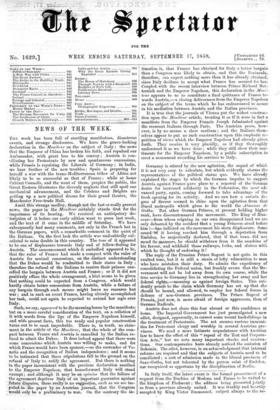NEWS OF THE WEEK.
THE week has been full of startling manifestoes, disastrous events, and strange disclosures. We have the grave-looking THE week has been full of startling manifestoes, disastrous events, and strange disclosures. We have the grave-looking
declaration in the Moniteur on the subject of -Italy; the news that the Emperor of China his broken his faith, and repulsed our Ambassador, with great loss to his convoy ; Austria is con- ciliating her Protestants by new and spontaneous concessions, while Prussia is repulsing the Liberals of Germany ; in India, we hear further of the new troubles ; Spain is preparing for herself a war with the trans-Mediterranean tribes of Africa not likely to be so successful as that of France ; while at home Cabinet Councils, and the want of them, perplex the public, the Great Eastern illustrates the slovenly neglects that still spoil our
mechanical advancement, and the Cobdens and Brights are getting up a new political drama fore their grand theatre, the Manchester Free-trade Hall.
Amid this strange medley, though not the last or really gravest news, the paper in the Monitcur certainly stands first for the importance of its bearing. We received an anticipatory tie- - aoription of it before our early edition went to press last week, and the text of it came in the middle of Saturday. We have subsequently had many comments, not only in the French but in the German papers, with a remarkable comment in the quiet of the Italians. On the first look the article was undoubtedly cal- culated to raise doubts in this country. The tone of it appeared to be one of displeasure towards Italy and of fellow-feeling for Austria. The announcement which it embodied appeared to be, that the ruler of France had made a compact with the ruler of Austria for mutual concessions, on the distinct understanding that the Dukes would be readmitted to their states in Italy ; therefore the refusal of the Italians to receive their princes can- celled the bargain between Austria and France ; or if it did not positively efface the whole arrangement, a hint seems to be given that nothing could be expected from a Congress, which would hardly obtain better concessions from Austria, while a failure of any bargain through such means might leave no resource but war ; and in such an event France, having already accomplished her task, could not again be expected to extend her aegis over Italy.
Such, we say, appeared to be the meaningborne by the manifesto; but on a more careful consideration of the text, on a collation of it with words from the lips of the Emperor Napoleon himself, and with present facts, this too ready and popular construction tarns out to be most improbable. There is, in truth, no state-
ment in the article of the Moniteur, that the whole of the com- pact between France and Austria is cancelled by the Italian re- fusal to admit the Dukes. It does indeed appear that there were some concessions which Austria was willing to make, and for which France would have been sponsor,—as the surrender of Ve- netia and the recognition of Italian independence ; and it seems to be intimated that these stipulations fall to the ground on the refusal of Italy to ratify the agreement. But there is nothing in the paper inconsistent with the previous declaration ascribed to the Emperor Napoleon, that henceforward Italy will stand exempt ; and although it may be an opinion that the failure of the agreement deprives Italy of an important guarantee against future disputes, there really is no suggestion, such as we see im- puted to the paper by an Austrian journal, that the Congress would only be a preliminary to war. On the contrary the in- timation is, that France has obtained for Italy a better bargain than a Congress was likely to obtain, and that the Peninsula, therefere, can expect nothing more than it has already obtained, since Italy declines to accept what France has secured for her. Coupled with the recent interview between Prince Richard Met- ternich and the Emperor Napoleon, this declaration in the Moni- teur appears to us to constitute a final quittance of France to- wards Austria,—a closing deliverance from the Emperor Napoleon on the subject of the terms which he has endeavoured to secure in his mediation between Austria and the Italian provinces.
It is true that the journals of Vienna put the widest construc- tion upon the Moniteur article, treating it as if it were in fact a manifesto from the Emperor Francis Joseph fulminated against the recusant Italians through Paris. The Austrian press, how- ever, is by no means a clear medium ; and the Italians them- selves appear to put no such construction upon this emphatic re- petition of views which the Emperor Napoleon had already given forth. They receive it very placidly, as if they thoroughly understood it as we have done ; while they still show their sen- timents for the Emperor Napoleon, by a public subscription to erect a monument recording his services to Italy.


























